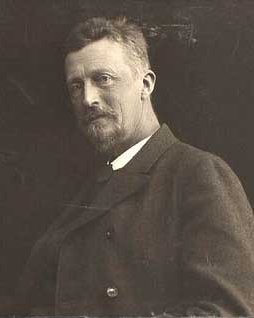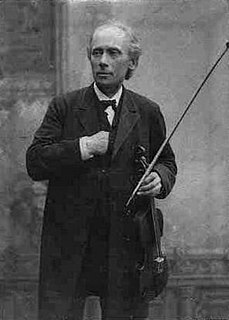
Peter Ludvig Nicolai Schram (5 September 1819 - 1 July 1895) was a Danish opera singer and actor.

Peter Ludvig Nicolai Schram (5 September 1819 - 1 July 1895) was a Danish opera singer and actor.
Schram was born on 5 September 1819 in Copenhagen, the son of grocer Lauritz Fussing Schram (1778–1830) and Marie Sophie Schram née Wexschall (1795–1866). His mother was a sister of the prominent violinist Friderich Thorkildsen Wexschall. He played four instruments before his confirmation and attended Giuseppe Siboni's music school at the Royal Danish Theatre from 1831. Carl Winsløw taught the 14-year-old boy natural declamation of verse (contrary to N. P. Nielsens's more declamatory style), J. P. E. Hartmann taught him music theory and Siboni worked with his voice before Henrik Rung and siden Manuel Garcia completed his training. [1]
Schram made his stage debut at the Royal Danish Theatre on 2 April 1834 in a student performance alongside Betty Smidth and Carl Hagen.
Schram had his debut in 1841. He was appointed to Kongelige Kammersangere in 1866.
Schram died in Copenhagen in 1895, aged 75. [2]
Aksel Schiøtz was a Danish tenor and later baritone, who was considered one of Europe's leading lieder singers of the post-World War II period.

Carl August Nielsen was a Danish composer, conductor and violinist, widely recognized as his country's most prominent composer.

Maskarade (Masquerade) is an opera in three acts by Carl Nielsen to a Danish libretto by Vilhelm Andersen, based on the comedy by Ludvig Holberg. It was first performed on 11 November 1906 at Royal Danish Theatre, Copenhagen. Maskarade has enjoyed enduring popularity in Denmark where it is considered to be the country's national opera.

The Royal Danish Academy of Music, or Royal Danish Conservatory of Music, in Copenhagen is the oldest professional institution of musical education in Denmark as well as the largest, with approximately 400 students. It was established in 1867 as Kjøbenhavns Musikkonservatorium by Niels Gade – who was also the first rector –, J.P.E. Hartmann and Holger Simon Paulli on the basis of a testamentary gift from the jeweler P.W. Moldenhauer, and with inspiration from the Leipzig Conservatory and a conservatory founded by Giuseppe Siboni in Copenhagen in 1827. Carl Nielsen was a teacher in the period 1916–1919 and the rector during the last year of his life.
The Léonie Sonning Music Prize, or Sonning Award, which is recognized as Denmark's highest musical honor, is given annually to an international composer or musician. It was first awarded in 1959 to composer Igor Stravinsky. Laureates are now selected by the directors of The Léonie Sonning Music Foundation, which was founded in 1965.

Holger Simon Paulli was a Danish conductor and composer. Paulli composed an opera, thirteen ballets, an overture, and pieces for violin and lieder.

Johan Peter Emilius Hartmann was, together with his son-in-law Niels W. Gade, the leading Danish composer of the 19th century. J.P.E. Hartmann was the third generation of composers in the Danish musical Hartmann family.
Emilie da Fonseca, married surnames Muller and Bratz was a Norwegian-Danish stage actor and opera singer. She belonged to the pioneer group of artists in the first national theatre in Norway. She was also among the most noted artists of her time in Norway.

Jean Baptiste Édouard Louis Camille Du Puy was a Swiss-born singer, composer, director, and violinist. He lived and worked in Copenhagen and Stockholm from 1793 until his death in 1822.
Otto Johann Anton Dütsch was a Danish composer, who worked in St. Petersburg for most of his short career.

Anna Helena Dorothea Nielsen, née Brenöe,, was a Danish stage actress and opera singer (mezzo-soprano). She was one of the most famous female stage artists in Denmark of her time. She was a mentor for many talents, such as for example Louise Phister and her private home was a center of the theatre world.

Giuseppe Siboni was an Italian operatic tenor, opera director, choir conductor, and voice teacher. He began his career in his native country in 1797 and actively performed in major Italian opera houses up through 1818. From 1806 to 1809 he performed successfully in London, and from 1810 to 1814 he was active in Vienna, where he enjoyed the friendship of Ludwig van Beethoven. He played a critical role in Danish musical life from 1819 until his death in 1839. In 1819 he joined the Royal Danish Theatre in Copenhagen, where he worked first as a singer and later as director of the opera chorus and head director. In 1827 he founded the Royal Conservatory of Music in Copenhagen. He was married three times during his life, including his second marriage to the sister of poet Franz von Schober. His third marriage produced a son, the composer and pianist Erik Siboni (1828–1892).

August Andreas Jerndorff was a Danish painter who is best known for his portraits.
Events from the year 1819 in Denmark.

Siegfried Saloman was a Danish violinist and composer. A contemporary of Franz Liszt, he was a pupil of Johannes Frederik Fröhlich, Holger Simon Paulli, Frederik Thorkildsen Wexschall and Johan Peter Emilius Hartmann, from whom he received violin-playing lessons. He toured extensively throughout Europe with the Swedish opera singer Henriette Nissen, to whom he was married in 1850. In 1842 his nine booklets of romances and songs were published in Hamburg.
Kongelige Kammersangere or The Royal Chamber Singer is a prestigious award given to Danish Opera singers by the monarch. Only about 50 people have received the award since it was started in 1700. The first non-native Danish person who was appointed as a royal chamber singer was the Italian Giuseppe Siboni, who in 1819 received Danish citizenship and became director of the Royal Theatre.

Karl Mantzius was a Danish actor, stage and film director, theatre scholar, and operatic baritone.

Lars Valdemar Tofte was a Danish violinist who taught for a half century and trained over 300 of Denmark's violinists.

Vilhelmine Leocadie Theresia Gerlach was a Danish-Swedish mezzo-soprano opera singer who sang at the Royal Danish Theatre from 1845 to 1866. Considered to have been the country's most successful female singer of her day, she retired from the Royal Theatre while still young but continued to perform and give singing lessons at the Casino Theatre.

Sophie Helene Henriette Keller née Rung (1850–1929) was a Danish operatic soprano, musician and singing teacher, who performed at the Royal Danish Theatre in Copenhagen from 1869. She founded both a conservatory for women and a women's concert association.
| Wikimedia Commons has media related to Peter Schram . |